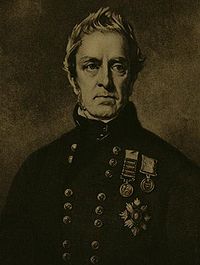George Pollock
Military person
Field Marshal Sir George Pollock, 1st Baronet, GCB, GCSI (4 June 1786 – 6 October 1872) was a British Army officer. He first saw action at the Battle of Deeg and at the Siege of Bhurtpore during the Second Anglo-Maratha War before taking part in the Anglo-Nepalese War. He also commanded the British artillery at the Battle of Prome and at Bagan during the First Anglo-Burmese War. Following a disastrous retreat from Kabul in January 1842 during the First Anglo-Afghan War, the retreating forces became stranded at the small British garrison at Jalalabad and Pollock was appointed Commander of the Force sent to relieve the garrison: he advanced through the Khyber Pass and relieved the garrison in April 1842. He then set about an unauthorised but ultimately successful mission to rescue the British hostages who had been left behind in Kabul prior to the retreat. In 1844 the Pollock Medal was created to commemorate Pollock's achievements: this medal was to be awarded to the "best cadet of the season" at the Addiscombe Military Seminary.
Personal facts
| Birth date | June 04, 1786 |
|---|
| Date of death | October 06, 1872 |
|---|
